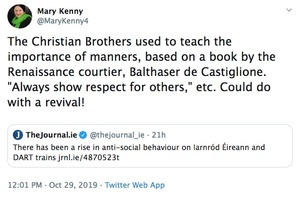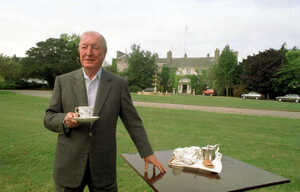Mary Kenny was to interview Kevin Myers at the Percy French festival in Roscommon
New: following our interview with @MaryKenny4 this morning, the organisers of the Percy French Festival have confirmed that she will no longer be attending the event in person ⬇️ pic.twitter.com/MO4vzjscUo
— Today RTÉ Radio 1 (@TodayRadioRTE) July 13, 2020
Of course I won’t flout quarantine prohibitions by speaking at the Percy French Festival at Roscommon next week. (Though I can come to Dublin and remain chez moi.) I hope others will attend – a great line-up of speakers. See: info@percyfrench.ie
— Mary Kenny (@MaryKenny4) July 13, 2020
This morning/afternoon.
“Covid-19 was not the Black Death,”Mary Kenny said [on Today with Sarah McInerney on RTE Radio One] . It killed “some” who were vulnerable, but for most the symptoms were flu-like and unpleasant. And as such the government’s response should be proportionate.
“People should be sensible and take precautions, they should proceed with their lives. There are risks in life.”
Meanwhile…
A lesson in performative dumbness for attention from troll Mary Kenny on #todayrte about quarantining. Asking would she have to stay in her “little house in Donnybrook without food or water” and whether this is the “death of Éireann'”.
— Glenn Fitzpatrick (@glennthefitz) July 13, 2020
FFS, people still not understanding that this was as much to do with NOT OVERWHELMING HEALTH SERVICES as it was about controlling the spread.
If less people get it at once, the higher chance of them having access to life saving treatment.
Mary is the draconian one.
— Emily Monroe (@emilystillalive) July 13, 2020
Someone take Mary Kenny’s temperature. I don’t think she can be well.
— Donna Dent (@DonnaDent1) July 13, 2020
G’wan Mary.
Don’t mind them fearful ninnies.
FIGHT!





